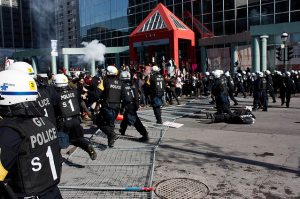To the international academic community
Greek Universities in Danger
In the last few years, a wave of ‘reforms’ within the European Union and throughout the world has subjected Higher Education to the logic of the market. Higher Education has increasingly been transformed from a public good and a civil right to a commodity for the wealthy. The self-government of Universities and the autonomy of academic processes are also being eroded. The processes of knowledge production and acquisition, as well as the working conditions of the academic community, are now governed by the principles of the private sector, from which Universities are obliged to seek funds.
Greece is possibly the only European Union country where attempts to implement these ‘reforms’ have so far failed. Important factors in this failure are the intense opposition of Greek society as well as the Greek Constitution, according to which Higher Education is provided exclusively by public, fully self-governed and state-funded institutions.
According to the existing institutional framework for the functioning of Universities, itself the result of academic and student struggles before and after the military dictatorship (1967-1974), universities govern themselves through bodies elected by the academic community. Although this institutional framework has contributed enormously to the development of Higher Education in Greece, insufficient funding and suffocating state control, as well as certain unlawful and unprofessional practices by the academic community, have rendered Higher Education reform necessary.
The current government has now hastily attempted a radical reform of Higher Education. On the pretext of the improvement of the ‘quality of education’ and its harmonization with ‘international academic standards’, the government is promoting the principles of ‘reciprocity’ in Higher Education. At the same time, it is drastically decreasing public funding for education (up to 50% decrease) which is already amongst the lowest in the European Union. New appointments of teaching staff will follow a ratio 1:10 to the retirement of existing staff members. This will have devastating results in the academic teaching process as well as in the progress of scientific knowledge.
The government proposals seek to bypass the constitutional obligations of the state towards public Universities and abolish their academic character.
The self-government of Universities will be circumvented, with the current elected governing bodies replaced by appointed ‘Councils’ who will not be accountable to the academic community.
The future of Universities located on the periphery, as well as of University departments dedicated to ‘non-commercial’ scientific fields, looks gloomy.
Academic staff will no longer be regarded as public functionaries. The existing national payscale is to be abolished and replaced by individualized, ‘productivity’ related payscales, while insecure employment is to become the norm for lower rank employees.
Higher Education will be transformed into ‘training’ and, along with research, gradually submitted to market forces.
The government proposals have been rejected by the Greek academic community. The Council of Vice-Chancellors and the Senates of almost all Universities have publicly called the government to withdraw the proposals and have suggested alternative proposals which can more effectively deal with the problems of Greek Universities. Despite this, the government proceeds with promoting its proposals, in confrontation with the entire academic community.
We appeal to our colleagues from the international academic community, who have experienced the consequences of similar reforms, to support us in our struggle to defend education as a public good. We fight, together with our British, French, Dutch, Italian, Spanish and other colleagues, for the respect of the academic tradition of the European universitas in current conditions.
We ask you to send electronically the appeal below, signed with your name and indicating your academic status and institutional affiliation, to the Initiative of Greek Academics (europeanuniversitas1@gmail.com). The support of the international academic community will prove invaluable for the upcoming developments not only in Greek Universities but in respect to European Higher Education as a whole.
Initiative of Greek academics
To: europeanuniversitas1@gmail.com
Subject: Defending Higher Education in Greece
Defending Higher Education in Greece
We, the undersigned, express our support for Greek academics who oppose the Higher Education reform proposed by the government, which hinders the research and teaching potential of Greek Universities.
Any process aiming to improve the institutional frame of Higher Education has to decisively take into account the positions of the academic community. We understand that the vast majority of the Senates of Greek Universities, the Council of Vice-Chancellors of Greek Universities, as well as the local organisations of University teachers have publicly expressed their opposition to government proposals.
We ask the Greek Prime Minister, Mr. Giorgos Papandreou, and the Minister of Education, Life-Long Learning and Religions, Ms. Anna Diamantopoulou
(a) not to proceed with voting the law, as the direction it has taken has proven devastating for Higher Education wherever it was implemented
(b) to start a real dialogue with the Senates of Universities aiming towards an institutional frame that will safeguard the constitutionally protected self-government of Universities and the public funding of Higher Education, and will respect the principles of European academic traditions regarding the public functioning of Universities.
http://supportgreekacademia.wordpress.com


 Follow
Follow



Net Zero Workers
There is a long history of wage freezes for workers that amount to wage cuts against rapidly rising costs of living. There was a time when governments were interested in supporting unions defending wages as a base for fair compensation for the work and a wage increase to maintain a decent standard of living against rising costs. In bad times, unions and employers could give and in depressions the unemployed ranks grow, families collapse, and businesses fold. Currently, governments are finessing to have it both ways. A psychology of governing parties is to assure consumers and investors that the economy is always looking up while convincing workers that the coffers are empty and the economy is recessing. While Athens burns business analysts comment daily that the markets are gaining lost ground. ‘Economic growth is on the horizon while we are pressed to freeze wages and put our fiscal house in order.’ Mixed messages for the consumer as worker, now the net zero worker.
“Net zero,” newspeak for wage freeze, was introduced as a mantra in about 2002 and repeated by the Public Sector Employers’ Council (PSEC) in British Columbia from 2008 to this current point. In 2010 the “net zero mandate” was reinforced in BC government or PSEC policy. Public sector workers were again net zero workers. The BCTF rallied hard against this and are standing up again to pool together all unions, as the governing party in BC again designated teachers as net zero workers. Let them bargain, let them mediate, Minister of Education George Abbott insisted in legislative debate on 12 March, as long as “all of that is within the context of net zero.”
Thirty years ago, top executive salaries were about 15 times that of the average worker’s. Now, those executive salaries are 75 times that of the worker’s. It’s increasingly difficult to accept one’s fate as a net zero worker in the face of skyrocketing executive salaries and lawless mismanagement. Of course, things might change should the net zero worker threaten to become a net zero consumer. Net zero spending was once called a boycott.
10 Comments
Posted in BC Education, Commentary, Employment rights, Government, Politics, Solidarity, Strikes & Labor Disputes, Unions, Working conditions
Tagged Economic Trends, Government, Working conditions